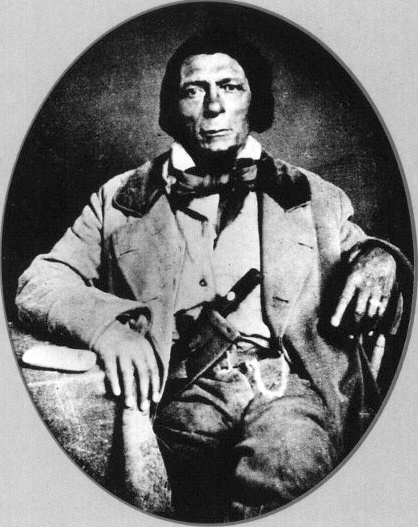American Explorers in the Mojave
James Beckwourth
1809 - 1868
James Pierson Beckwourth (April 6, 1798, Fredericksburg, Virginia - October 29, 1866, Denver) (a.k.a. Jim Beckworth, James P. Beckwith) was born in Virginia in 1798 to Sir Jennings Beckwith, a descendant of Irish and English nobility, and an African-American mulatto woman about whom little is known.
James Beckworth enjoyed nature and adventure, and it was not long before he set out to explore the vast expanses of what would become that which kept the Atlantic and Pacific Oceans apart.
Places still bear his name. In 1824 he was living in Missouri when he joined Gen. William Ashley's expedition to explore the Rocky Mountains. Although his activities remain largely unknown during this time Beckwourth became known as a prominent Indian fighter and guide often hired by settlers to guide wagon trains through the Sierra Nevada. He later became a horse trader supplying migrants and others, and then later conducted a horse thief operation against the Spanish with fellow Mountain Men.
The company's largest raid took place in 1840 when Beckwourth, in cooperation with Native Americans led by Ute Chief Wakara, over Cajon Pass successfully raiding nearly all the ranches from San Gabriel to San Bernadino of over 1,200 horses. Despite several battles with Spanish posses, including a gunfight against a posse of 75 men led by Governor Jose Antonio Carrillo, at Resting Springs the gang managed to escape.
Beckwourth eventually began ranching, mostly with stolen horses, until he was chased out by vigilantes in 1855. Travelling to the Colorado Territory he became a scout for the Union Army and later lived in Denver as a storekeeper. In 1864 Beckwourth returned to the mountains acting as a guide for John M. Chivington during the Sand Creek Massacre.
Later in his life, Jim recounted his astonishing life to Thomas D. Bonner, who set the book The Life and Adventures of James P. Beckwourth: Mountaineer, Scout, Pioneer and Chief of the Crow Nation to type. As notable as are the adventures, Jim's linguistic and stylistic prowess also impresses as being beyond the normal scope of reportage. The lessons of the book have currency, and much can be learned that might help us understand the role of alcohol in the US Government, how occupations effect the occupied, our historical relationship to diseases, wildlife, and the environment...among other things, including massacres and war.
Beckwourth's death came at age 69, while guiding a military column to a Crow Tribe in Montana. Complaining of severe headaches and suffering nosebleeds (most probably a severe case of hypertension), Beckworth returned to the Crow village where he died on October 29, 1866. The founder of the "Rocky Mountain News", William Byers, used the news of the death of Beckworth to publish a circulation-boosting, baseless yarn stating that the Crow had poisoned Beckworth, a falsehood that is repeated to this day.
Beckwourth Pass, California
Beckwourth Pass, named in honor of James Beckwourth, is located in the Sierra Nevada Mountains in Plumas County, California. California State Route 70 crosses the Sierras at an elevation of 1,591 m (5,221 ft.), making it one of the lowest crossings of the Sierra Nevadas in California. It is also the route that the Union Pacific Railroad (former Western Pacific Railroad) used to cross the Sierra's along their Feather River route. The pass is located east of Portola, California.
In 1851, Beckwourth, following an Indian trail, discovered a low elevation pass over the Sierra Nevada mountains into California. He improved what became known as the Beckwourth Trail through Plumas, Butte and Yuba counties. In August, 1851, he led the first intact wagon train into the burgeoning Gold Rush city of Marysville, California, named after Mary Murphy, a survivor of the Donner Party in the winter of 1846-47. Beckwourth demanded payment for improving the trail, claiming he had an agreement with the city and its merchants. When the city failed to pay him, he had no standing as a dark-skinned man in a California court to sue for damages. An estimated 10,000 people used the trail to enter Marysville in the following decade. In 1996, at the urging of promoters of Beckwourth Frontier Days, a living history festival, the city of Marysville's largest park was renamed Beckwourth Riverfront Park in recognition of the debt owed by the city and Beckwourth's significance to the growth of the city.
Further reading
Bonner, T.D., James P. Beckwourth: Mountaineer, Scout, Pioneer and Chief of the Crow Nation, Ross & Haines, Inc., 1965
Oswald, Delmot R. "James P. Bechwourth", featured in "Trappers of the Far West", Leroy R. Hafen, editor. 1972, Arthur H. Clark Company, reprint University of Nebraska Press, October 1983. ISBN 0-8032-7218-9
Sifakis, Carl, The Encyclopedia of American Crime, Facts of File Inc., 1982
Hotchkiss, Bill. Medicine Calf (novel).
source -
Jim Beckwourth
